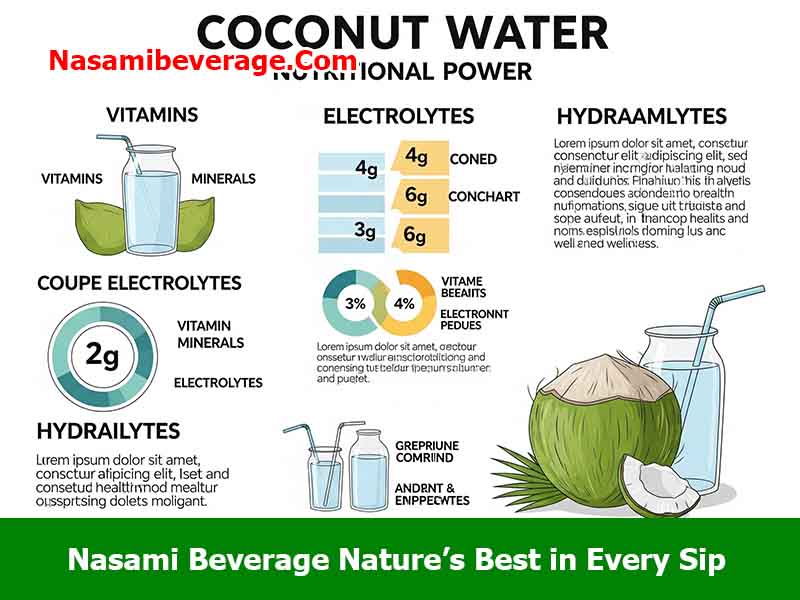For centuries, people in tropical regions have revered coconut water as a source of natural refreshment and vitality. Today, its popularity has surged worldwide, moving from a niche health product to a mainstream beverage powerhouse. But is it just a trendy drink, or does it live up to the hype? This guide explores the 10 proven health benefits of coconut water, backed by science, to show you why this natural elixir might be the ultimate healthy beverage. From superior hydration to glowing skin and a healthier heart, we will uncover the facts behind this incredible drink.
What’s inside? A guide to coconut water’s nutritional power
Before we dive into the benefits, it is essential to understand what makes coconut water so special. Unlike coconut milk, which is a blend of coconut flesh and water, coconut water is the clear liquid found inside young, green coconuts. It is a naturally low-calorie and fat free beverage.
A breakdown of essential vitamins and minerals
The real magic of coconut water lies in its impressive nutritional profile. It is packed with vitamins and minerals your body needs to thrive.

A single cup (8 ounces or 240ml) of 100% pure coconut water typically contains:
- Calories: 45–60
- Carbohydrates: 11–15 grams
- Natural Sugar: 9–12 grams
- Potassium: 15–20% of the Daily Value (DV)
- Magnesium: 10–15% of the DV
- Manganese: 15–20% of the DV
- Vitamin C: 8–10% of the DV
- Calcium: 4% of the DV
Its standout nutrient is potassium, a crucial electrolyte that plays a vital role in everything from fluid balance to nerve signals.
Understanding natural vs. added sugars
One of the most important things to check when buying a commercial beverage is the sugar content. Pure coconut water’s sweetness comes from naturally occurring sugars.
However, many brands add extra sugar or fruit juices, which increases the calorie count and diminishes the health benefits.
When choosing a product from brands like Vita Coco or Harmless Harvest, always check the label for “100% coconut water” and ensure “added sugars” is at zero.
Nature’s sports drink: Hydration and post-workout recovery
Perhaps the most celebrated benefit of coconut water is its ability to hydrate. Proper hydration is critical for energy levels, brain function, and overall health.
Replenishing natural electrolytes for peak performance
Sweat during exercise, you lose more than just water; you lose essential electrolytes like potassium, sodium, and magnesium. Coconut water is a natural source of these minerals, making it an excellent choice for rehydration.
Potassium, in particular, helps maintain fluid balance and supports proper muscle function, which can help prevent cramps after a moderate workout.
Coconut water vs. Sports drinks: A head-to-head battle
How does coconut water stack up against commercial sports drinks like Gatorade or Powerade?

- For light to moderate exercise: Coconut water is a fantastic option. It provides electrolytes and some carbohydrates for energy with significantly less sugar and fewer artificial ingredients than most sports drinks.
- For intense, prolonged exercise (over 90 minutes): A traditional sports drink might have the edge. They are specifically formulated with higher levels of sodium, the main electrolyte lost in sweat, and more carbohydrates to sustain high-intensity effort.
For the average person enjoying a jog, a bike ride, or a gym session, coconut water provides effective and natural replenishment.
Top proven health benefits of coconut water
Beyond hydration, regular consumption of coconut water is linked to several long term health advantages that support your body’s most vital systems.
Supporting heart and kidney health
Maintaining a healthy heart is crucial, and what you drink can play a big role. The high potassium content in coconut water is a major contributor to cardiovascular wellness.
Studies have shown that potassium can help lower blood pressure in people with high or normal blood pressure, largely by helping the body excrete excess sodium.
Furthermore, some animal studies have indicated that coconut water may help reduce blood cholesterol and triglycerides.
Staying adequately hydrated is also one of the best ways to support your kidneys. Research suggests that coconut water can be beneficial in preventing kidney stones. It helps flush the system and may prevent crystals from sticking to the kidneys and urinary tract.
Promoting radiant skin and smooth digestion
The benefits of coconut water extend to your appearance and digestive wellness. Its antioxidant properties help neutralize oxidative stress from free radicals, which can contribute to signs of aging. Staying hydrated with coconut water also keeps your skin supple, firm, and glowing.

For digestive health, coconut water contains manganese, an essential mineral that supports the function of several enzymes in the body. While more research is needed, its hydrating properties and mineral content contribute to a healthy digestive process.
Making the right choice: A practical guide to coconut water
With so many options available, choosing the right coconut water can seem daunting. Here’s what you need to know.
Fresh vs. Packaged: Which is better?
There is nothing quite like drinking water straight from a fresh young coconut. It is the purest form, free from any processing. However, packaged coconut water from brands like ZICO or Taste Nirvana is a highly convenient and healthy alternative.
When buying packaged, look for options that are not from concentrate and are free from added sugars or flavorings to get the most benefits.
Pink coconut water, often from brands like Harmless Harvest, gets its color from antioxidants interacting with light and is a sign of high quality processing.
Potential risks and how much to drink daily
While coconut water is safe for most people, there are a few considerations. Due to its high potassium content, individuals with kidney disease should consult their doctor before adding it to their diet to avoid a condition called hyperkalemia (dangerously high potassium levels).

For most healthy individuals, drinking one to two cups (8–16 ounces) of coconut water daily is a safe and beneficial amount. Consuming it in excess could lead to a laxative effect or an overabundance of calories.
Frequently asked questions
What is the best time of day to drink coconut water?
You can enjoy coconut water any time of day. Many prefer it in the morning to start their day hydrated, or post-workout to replenish lost electrolytes.
Can drinking coconut water help you lose weight?
As a low calorie and fat free alternative to sodas and sugary juices, coconut water can support weight management. Its hydrating properties can also boost metabolism, but it is not a magic weight loss solution on its own.
Is coconut water safe for people with diabetes?
Unsweetened coconut water has a relatively low sugar content and may be a good option in moderation. Studies on animals suggest it may help lower blood sugar levels. However, it’s best to consult a doctor and monitor blood sugar when incorporating it into your diet.
Is it okay to drink coconut water every day?
Yes, for most people, drinking coconut water daily is perfectly healthy and offers numerous benefits. Just be mindful of your overall calorie and sugar intake.
Does coconut water have more potassium than a banana?
Yes. A single cup of coconut water can contain over 600 mg of potassium, which is significantly more than a medium-sized banana (around 420 mg).
The natural choice for better health
From its powerful hydrating electrolytes to its potential to support heart, kidney, and skin health, coconut water has certainly earned its place as a super-beverage. It serves as a delicious, natural, and nutrient-rich alternative to sugary drinks.
Whether you drink it after a workout or as a daily refreshment, you are making a positive choice for your overall well-being. This guide was compiled by the beverage experts at Nasami Beverage to provide you with comprehensive and reliable health information.